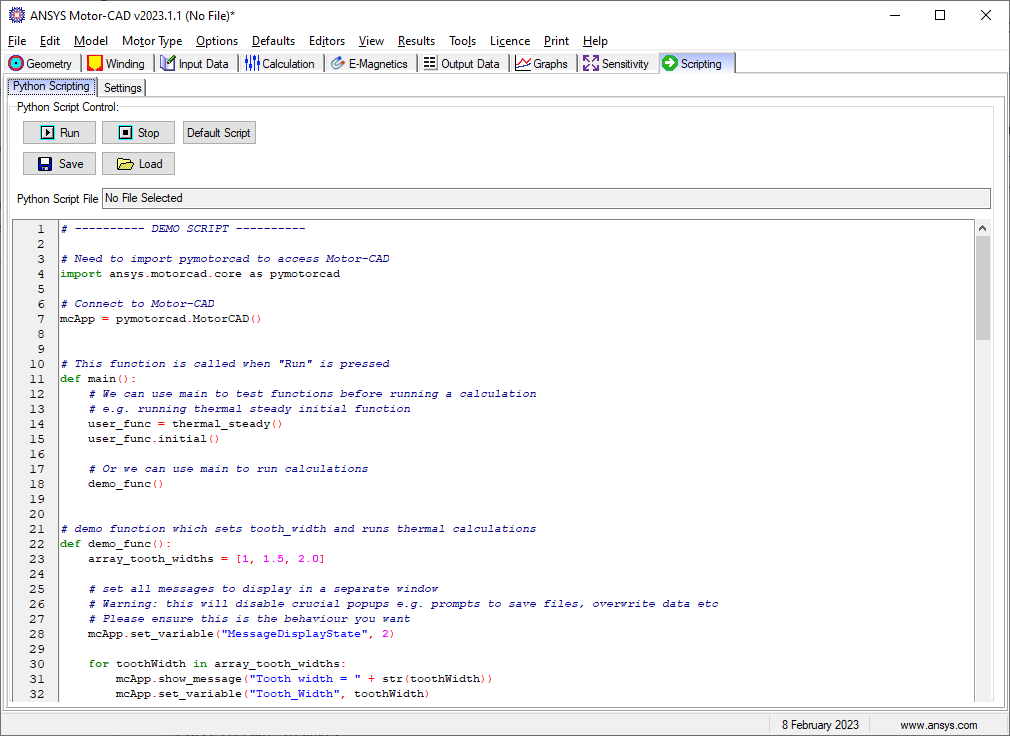Motor-CAD internal Scripting tab#
The Scripting tab in Motor-CAD facilitates creating, editing, loading, and saving internal Python scripts within Motor-CAD.

Scripting -> Settings tab in Ansys Motor-CAD 2023 R1#
From the Scripting tab in Motor-CAD, you can connect from an internal script by
accessing the MotorCAD() object with this code:
import ansys.motorcad.core as pymotorcad
mcApp = pymotorcad.MotorCAD()
With the MotorCAD API, you can use PyMotorCAD methods to send commands to the current Motor-CAD instance. For example, you can set and get values before, during, and after calculations. You can also create a script for Motor-CAD automation.
In the following image, the Scripting tab shows the demo script. You can use this default script as a starting point for scripting internally in Motor-CAD. However, you can also add and run any Python script from this tab.

Scripting -> Python Scripting tab in Ansys Motor-CAD 2023 R1#
Demo script example#
The demo script is shown by default on the Scripting tab in Moto-CAD to providing examples of how you use PyMotorCAD methods and Motor-CAD automation parameters.
For more information, see the Motor-CAD Automation tutorial (section 2.iii), provided with the Motor-CAD installation.
Setup#
Import pymotorcad to access Motor-CAD.
import ansys.motorcad.core as pymotorcad
Connect to Motor-CAD.
mcApp = pymotorcad.MotorCAD()
Main function#
The main function is called when Run is pressed in the Motor-CAD GUI.
You can use the main function to test other functions before running a
calculation. For example, you can use it to run the thermal_steady() and
initial() functions. You can also use it to run calculations within another
defined function, such as the demo_func function.
def main():
user_func = thermal_steady()
user_func.initial()
demo_func()
Demo function#
The defined demo_func function sets the tooth_width function and
runs thermal calculations.
All messages are set to display in a separate window using this PyMotorCAD method:
mcApp.set_variable("MessageDisplayState", 2)
Note
- This PyMotorCAD method disables crucial popups, including prompts to save files
and overwrite data. Ensure that this is the desired behavior.
The demo_func function defines a range of values for the tooth_width
function, runs a steady state thermal calculation, and gets the average winding
temperature for each. Results are shown in the message window.
The last line of the function resets the message window.
def demo_func():
array_tooth_widths = [1, 1.5, 2.0]
mcApp.set_variable("MessageDisplayState", 2)
for toothWidth in array_tooth_widths:
mcApp.show_message("Tooth width = " + str(toothWidth))
mcApp.set_variable("Tooth_Width", toothWidth)
mcApp.do_steady_state_analysis()
temperature = mcApp.get_variable(
"T_[WINDING_AVERAGE]",
)
mcApp.show_message("Winding temperature = " + str(temperature))
mcApp.set_variable("MessageDisplayState", 0)
Functions run during calculations#
The previously described functions run only when the Run During Analysis option is selected from the Scripting -> Settings tab in Motor-CAD. (This option appears under the Script Control heading.)

Scripting -> Settings tab in Ansys Motor-CAD 2023 R1#
If the Run During Analysis option is selected, the script is imported.
This means that anything other than setting up the MotorCAD object should
be moved to a function or class to avoid unexpected behavior.
Five classes are defined: thermal_steady, thermal_transient,
emagnetic, mechanical_stress and mechanical_forces.
Each of these classes contains the initial and final functions.
The thermal classes also contain the main function.
initialis called before the calculation.finalis called after the calculation.mainis called before each time step in a calculation.
The thermal_steady class contains functions for steady-state
thermal calculations:
class thermal_steady:
def initial(self):
self.step = 0
print("Thermal Steady State - Initial")
def main(self):
self.step = self.step + 1
print("Step: " + str(self.step) + ". Thermal Steady State - Main")
def final(self):
print("Thermal Steady State - Final")
The thermal_transient class contains functions for transient
thermal calculations:
class thermal_transient:
def initial(self):
self.step = 0
print("Thermal Transient - Initial")
def main(self):
self.step = self.step + 1
print("Step: " + str(self.step) + ". Thermal Transient State - Main")
def final(self):
print("Thermal Transient - Final")
The emagnetic class contains functions for E-Magnetic calculations:
class emagnetic:
def initial(self):
print("E-Magnetic - Initial")
def final(self):
print("E-Magnetic - Final")
The mechanical_stress class contains functions for Mechanical stress calculations:
class mechanical_stress:
def initial(self):
print("Mech Stress - Initial")
def final(self):
print("Mech Stress - Final")
The mechanical_forces class contains functions for Mechanical force calculations:
class mechanical_forces:
def initial(self):
print("Mech Forces - Initial")
def final(self):
print("Mech Forces - Final")
For any scripts that are to be run before, during, or after a particular Motor-CAD calculation, these functions can be added to the relevant functions.

